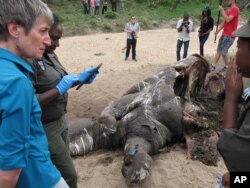South Africa's Constitutional Court has dismissed an appeal by the Department of Environmental Affairs to keep a moratorium on the domestic trade in rhino horn, according to court documents Reuters saw Wednesday.
Pelham Jones, chairman of South Africa's Private Rhino Owners Association (PROA), which was one of the respondents in the case, told Reuters the decision meant that the sale of rhino horns was legal in South Africa.
"We welcome the Constitutional Court ruling. We believe it is a right we have been entitled to," he said.
A global ban in the horn trade, which is regulated by a U.N. convention, remains in place, which means horn acquired legally in South Africa cannot be exported from the country.
Last May, South Africa's Supreme Court of Appeal dismissed the government's bid to uphold a ban on the domestic trade in rhino horn, which was put in place in 2009. The Constitutional Court was its last judicial option.
"This court ... has concluded that the application should be dismissed with costs as it lacks reasonable prospects of success," the Constitutional Court said in a brief order.
A spokeswoman for South Africa's Department of Environmental Affairs said it would issue a statement shortly.
Need to cover costs
Private rhino ranchers and other associations initiated the court action, saying they needed to sell horn to be able to afford spiraling security costs that include armed patrols, helicopters and electric fencing.
According to the latest figures from PROA, over 6,500 rhinos are in private hands in South Africa, over a third of the national population.
Rhino horn can be harvested as it grows back and it can be removed from a tranquilized animal.
The government has not revealed the size of its rhino horn stockpile, but PROA estimates its members have around 6 tons and reckons the state has close to 25 tons. The combined 31 tons could fetch $2 billion by some estimates.
Conservationists have expressed concerns that domestic buyers could also illicitly supply markets in Vietnam and China, where demand for rhino horn — coveted as an ingredient in traditional medicine — has triggered a wave of poaching.
The number of rhinos poached for their horns in South Africa fell 10 percent in 2016 to 1,054, the second straight year of decline, according to government data, but conservationists have said the levels remain alarming.
Earlier spike
Poaching incidents in South Africa had surged from 83 in 2008 to a record 1,215 in 2014 to meet red-hot demand in newly affluent Asian countries such as Vietnam.
South Africa has more than 80 percent of the world's rhino population, with about 18,000 white rhinos and close to 2,000 black rhinos, which is why it has been at the front line of the horn-poaching crisis involving global crime syndicates.
But Jones said PROA was consulting with security firms to ensure "blood horns" did not enter the market.
"We are in an advanced stage of setting up a domestic trade desk and are consulting with economists to determine market prices," he told Reuters.
Trade will still be subject to regulation by the government, which issues permits. Potential domestic buyers could include those who see rhino horn as a store of wealth that could appreciate in value and those who want it as a decoration.














